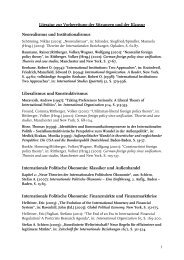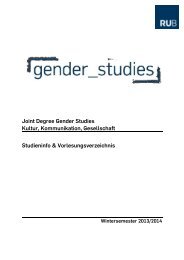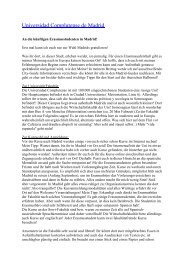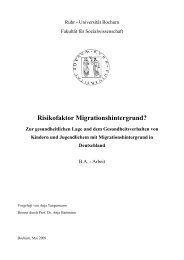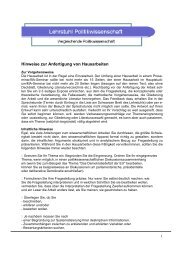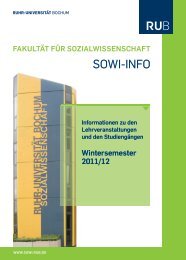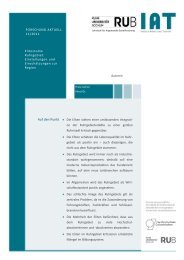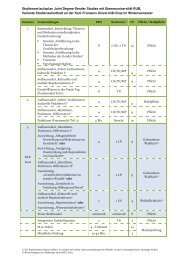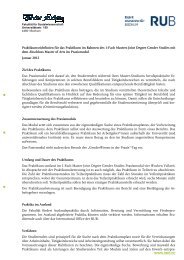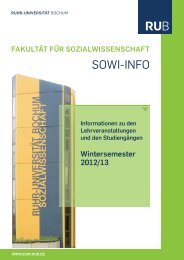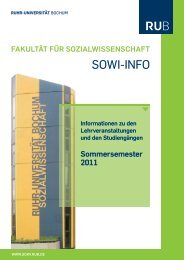View - Fakultät für Sozialwissenschaft der Ruhr-Universität Bochum
View - Fakultät für Sozialwissenschaft der Ruhr-Universität Bochum
View - Fakultät für Sozialwissenschaft der Ruhr-Universität Bochum
You also want an ePaper? Increase the reach of your titles
YUMPU automatically turns print PDFs into web optimized ePapers that Google loves.
Wilkesmann/Rascher self-governance and slowness page 27<br />
Summary<br />
It is not possible to organize knowledge management externally by simple instructions.<br />
Structures are necessary which lead to cooperative actions in the sense of passing on data and<br />
generating new knowledge together. This kind of self-governance can be supported by small<br />
groups without any power differences which make it easier to implement social norms or by<br />
those core dimensions which define a large scope according to Hackman and Oldham. Both<br />
structures are relevant for generating new knowledge. In small groups without any power<br />
differences it is possible to introduce a social norm which guarantees cooperative actions.<br />
Intrinsic motivation can also guarantee acting cooperatively. A large scope (described by<br />
Hackman and Oldham's core dimensions) supports the attribution of intrinsic motivation.<br />
Small groups are irrelevant for the area of storing and using data, because especially large<br />
groups are to be reached. Nevertheless, room for manoeuvre is important for supporting<br />
intrinsic motivation. The two hypotheses which postulate a connection between the amount of<br />
scope on the one hand and the attribution of intrinsic motivation or acting cooperatively on<br />
the other hand have been confirmed with slight reservations. Thus it can be proved that selfgovernance,<br />
which is defined by the structures called core dimensions in this case, makes<br />
autonomous actions possible and that it is a method to organize knowledge management in a<br />
reasonable way.<br />
An important dimension of autonomy is temporal sovereignty, which has been defined as<br />
slowness here. A very tight schedule, which is predetermined externally, makes the<br />
generation of intrinsic motivation impossible and might even destroy existing intrinsic<br />
motivation, because it is perceived as external control.<br />
Self-governance does not come into existence by itself, it is the result of an intra-company<br />
negotiation process. In Germany an important actor in this negotiation process is the works<br />
council. Its attitude towards knowledge management and, as a consequence, towards these<br />
negotiation processes which lead to company agreements depends on its experiences with the<br />
implementation of knowledge management measures. This fact un<strong>der</strong>lines the importance of a<br />
participation oriented change management process.<br />
Nevertheless, knowledge management will only succeed, if self-governance develops and the<br />
respective conditions for negotiation processes exist in the companies. Otherwise<br />
"graveyards" for knowledge and data will develop.<br />
27



